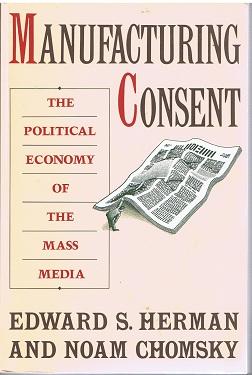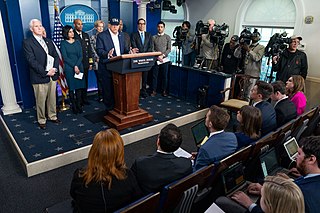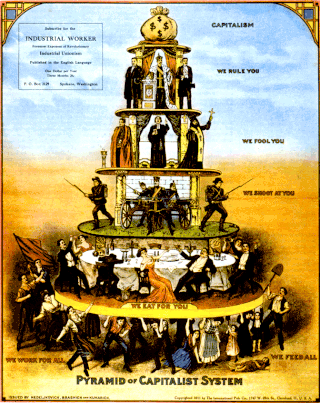
A euphemism is an innocuous word or expression used in place of one that is deemed offensive or suggests something unpleasant. Some euphemisms are intended to amuse, while others use bland, inoffensive terms for concepts that the user wishes to downplay. Euphemisms may be used to mask profanity or refer to topics some consider taboo such as disability, sex, excretion, or death in a polite way.

Manufacturing Consent: The Political Economy of the Mass Media is a 1988 book by Edward S. Herman and Noam Chomsky. It argues that the mass communication media of the U.S. "are effective and powerful ideological institutions that carry out a system-supportive propaganda function, by reliance on market forces, internalized assumptions, and self-censorship, and without overt coercion", by means of the propaganda model of communication. The title refers to consent of the governed, and derives from the phrase "the manufacture of consent" used by Walter Lippmann in Public Opinion (1922). The book was honored with the Orwell Award.

Propaganda is communication that is primarily used to influence or persuade an audience to further an agenda, which may not be objective and may be selectively presenting facts to encourage a particular synthesis or perception, or using loaded language to produce an emotional rather than a rational response to the information that is being presented. Propaganda can be found in a wide variety of different contexts.
A dysphemism is an expression with connotations that are derogatory either about the subject matter or to the audience. Dysphemisms contrast with neutral or euphemistic expressions. Dysphemism may be motivated by fear, distaste, hatred, contempt, or humour.

In public relations and politics, spin is a form of propaganda, achieved through knowingly providing a biased interpretation of an event or campaigning to influence public opinion about some organization or public figure. While traditional public relations and advertising may manage their presentation of facts, "spin" often implies the use of disingenuous, deceptive, and manipulative tactics.

Orwellian is an adjective describing a situation, idea, or societal condition that George Orwell identified as being destructive to the welfare of a free and open society. It denotes an attitude and a brutal policy of draconian control by propaganda, surveillance, disinformation, denial of truth (doublethink), and manipulation of the past, including the "unperson"—a person whose past atrocity is idealised from the public record and memory, practised by modern repressive governments. Often, this includes the circumstances depicted in his novels, particularly Nineteen Eighty-Four but political doublespeak is criticized throughout his work, such as in Politics and the English Language.
Obfuscation is the obscuring of the intended meaning of communication by making the message difficult to understand, usually with confusing and ambiguous language. The obfuscation might be either unintentional or intentional, and is accomplished with circumlocution, the use of jargon, and the use of an argot of limited communicative value to outsiders.

A slogan is a memorable motto or phrase used in a clan, political, commercial, religious, and other context as a repetitive expression of an idea or purpose, with the goal of persuading members of the public or a more defined target group. The Oxford Dictionary of English defines a slogan as "a short and striking or memorable phrase used in advertising." A slogan usually has the attributes of being memorable, very concise and appealing to the audience.

"Politics and the English Language" (1946) is an essay by George Orwell that criticised the "ugly and inaccurate" written English of his time and examined the connection between political orthodoxies and the debasement of language.
Loaded language is rhetoric used to influence an audience by using words and phrases with strong connotations. This type of language is very often made vague to more effectively invoke an emotional response and/or exploit stereotypes. Loaded words and phrases have significant emotional implications and involve strongly positive or negative reactions beyond their literal meaning.
The following outline is provided as an overview of and topical guide to public relations:
The NCTE George Orwell Award for Distinguished Contribution to Honesty and Clarity in Public Language is an award given since 1975 by the Public Language Award Committee of the National Council of Teachers of English. It is awarded annually to "writers who have made outstanding contributions to the critical analysis of public discourse."
The National Council of Teachers of English (NCTE) is a United States professional organization dedicated to "improving the teaching and learning of English and the language arts at all levels of education. Since 1911, NCTE has provided a forum for the profession, an array of opportunities for teachers to continue their professional growth throughout their careers, and a framework for cooperation to deal with issues that affect the teaching of English." In addition, the NCTE describes its mission as follows:
The Council promotes the development of literacy, the use of language to construct personal and public worlds and to achieve full participation in society, through the learning and teaching of English and the related arts and sciences of language.
Fall guy is a colloquial phrase that refers to a person to whom blame is deliberately and falsely attributed in order to deflect blame from another party.

Animal Farm is a 1954 adult animated drama film directed by documentarians John Halas and Joy Batchelor. It was produced by Halas and Batchelor and funded in part by the Central Intelligence Agency (CIA), who also made changes to the original script. Based on the 1945 novel of the same name by George Orwell, Maurice Denham provides the voice for all the animals in the film.

Propaganda techniques are methods used in propaganda to convince an audience to believe what the propagandist wants them to believe. Many propaganda techniques are based on socio-psychological research. Many of these same techniques can be classified as logical fallacies or abusive power and control tactics.
Doublethink is a process of indoctrination in which subjects are expected to simultaneously accept two conflicting beliefs as truth, often at odds with their own memory or sense of reality. Doublethink is related to, but differs from, hypocrisy.
The Doublespeak Award was a humorous award in the United States of America. It was described as an "ironic tribute to public speakers who have perpetuated language that is grossly deceptive, evasive, euphemistic, confusing, or self-centered", i.e. those who have engaged in doublespeak. It was issued by the US National Council of Teachers of English between 1974 and 2020. Nominees needed to be from the US, though in 1975 the award was given to Yasser Arafat. In 2022, it was announced the award would be superseded by an annual list of multiple examples of such language from a public spokesperson or group, to be called The Year in Doublespeak.
In George Orwell's dystopian novel Nineteen Eighty-Four, Newspeak is the fictional language of Oceania, a totalitarian superstate. To meet the ideological requirements of Ingsoc in Oceania, the Party created Newspeak, which is a controlled language of simplified grammar and restricted vocabulary designed to limit the individual person's ability to think critically or to articulate subversive concepts, such as personal identity, self-expression, and free will. In Oceania, such thoughts are thoughtcrimes that contradict Ingsoc orthodoxy.
Dennis Baron is a professor of English and linguistics at the University of Illinois at Urbana-Champaign. His research focuses on the technologies of communication; language legislation and linguistic rights; language reform; gender issues in language; language standards and minority languages and dialects; English usage; and the history and present state of the English language.








